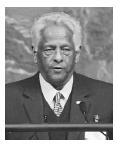MAURITIUS
Anerood Jugnauth
Prime Minister

(pronounced "ah-neh-ROOD joo-NO")
"…a small island state like Mauritius can only progress if we open up our economy to foreign investment and technology and follow liberal and investment-friendly policies."
The Republic of Mauritius lies in the Indian Ocean approximately 800 km (497 mi) east of Madagascar. It is comprised of the volcanic island of Mauritius as well as the Rodrigues, the Agalega islands, and the Cargados Carajos shoals. In total, the territory covers 1,860 sq km (718 sq mi) and had a population estimated at 1,200,206 in 2002. Like other previously uninhabited islands in the Indian Ocean, the diverse population of Mauritius is the result of successive waves of explorers, colonists, traders, and workers who have settled there.
When the British abolished slavery in 1835, the sugar plantations—a mainstay of the Mauritian economy—could no longer rely on sources of imported labor from the Comoros, Madagascar, and the East African coast. To compensate for the loss of workers, enormous numbers of indentured laborers were brought from India to Mauritius to work the cane fields and man the sugar mills. These workers came from different regions of the Indian subcontinent and brought their respective languages and religious practices. By 1860, they comprised the largest single ethnic group in the country.
As of 2003, the population of Mauritius was primarily made up of descendants from India (68%), mixed European and African (Creole, 27%), China (Sino-Mauritians, 3%), and France (Franco-Mauritian, 2%). Approximately 42% of the population lives in the urban center of the main island. The major religions are Hinduism, Islam, and Christianity. The official languages are English and French, with Creole, Hindi, and other languages—such as Bojpoori, Urdu, Hakka, and Chinese—in use. The official currency is the Mauritian rupee. The per capita gross domestic product (GDP) was estimated at US $10,400 (2000 estimate), which is a very high average for a sub-Saharan African country. The literacy rate in 2000 was 83%, while population growth in 2002 was less than one percent, compared to other in sub-Saharan African countries where the growth rate averages 2.6%.
The economy of Mauritius was originally based on sugar, and sugar cultivation still claims 80% of the arable land. In recent decades, the country has significantly diversified and expanded its economy into manufacturing (textiles, electronics and software), other agricultural products (such as tea), and tourism. Offshore banking facilities were begun in 1989. The country supports an independent press with publications in several languages. Mauritius is considered to be one of the most successful economies in all of Africa.
ADDRESS
Prime Minister's Office
Government House
Port Louis
Republic of Mauritius
Comment about this article, ask questions, or add new information about this topic: